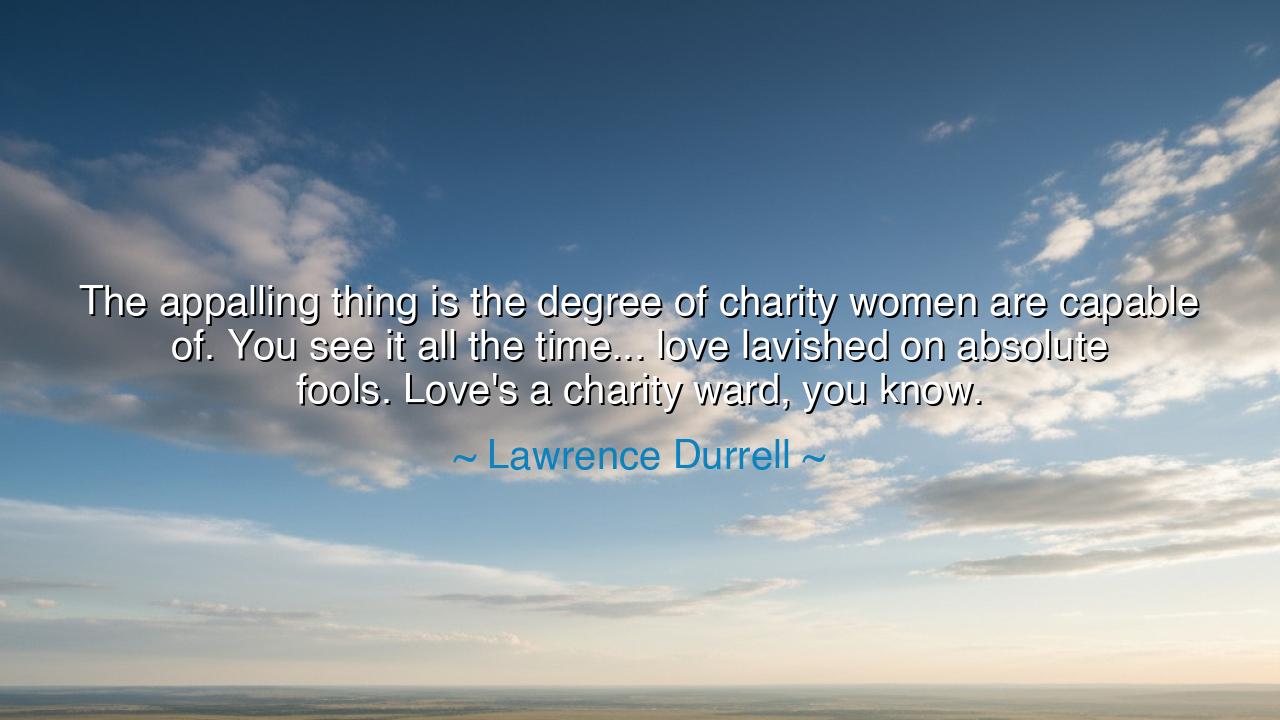
The appalling thing is the degree of charity women are capable
The appalling thing is the degree of charity women are capable of. You see it all the time... love lavished on absolute fools. Love's a charity ward, you know.






“The appalling thing is the degree of charity women are capable of. You see it all the time… love lavished on absolute fools. Love’s a charity ward, you know.” Thus wrote Lawrence Durrell, the poet and novelist of the human heart, whose works were filled with both the beauty and the tragedy of love. In this sharp yet tender observation, Durrell captures a paradox at the very core of human affection—the way love, especially the love of women, can transcend reason and worth, flowing even toward those who do not deserve it. His words, though edged with irony, conceal a reverence for the depth of compassion that women—and indeed all true lovers—can possess: a charity of the heart, pure, selfless, and often unreciprocated.
When Durrell calls this capacity “appalling,” he does not mean monstrous or vile, but overwhelming—so vast that it humbles the observer. He marvels at how love, when it is true, is not governed by merit or logic. The charity of women he speaks of is not the polite giving of small kindnesses; it is the sacrificial love that endures disappointment, forgives betrayal, and still chooses to care. It is the love of a mother for a wayward child, or a lover for a man blind to her devotion. Such love, uncalculating and fierce, is both a miracle and a wound. It transforms the heart into a “charity ward”—a place where broken souls are healed and where those unworthy of tenderness are nursed by it nonetheless.
The origin of this reflection can be found in Durrell’s own life and the world he inhabited—a world of romance, ruin, and exile. His most famous work, The Alexandria Quartet, explores love in all its contradictions: sensual and spiritual, selfish and saintly, cruel and redemptive. Durrell himself had seen love’s double edge; his relationships were often tempestuous, his life marked by beauty and heartbreak alike. Through his art, he came to understand that love is not always noble in the worldly sense. It does not choose wisely; it simply gives. And when it gives, it gives entirely. His words are both lament and awe—a recognition that love’s power to forgive and endure may border on divine madness.
Consider the story of Marie Curie, the great scientist whose love for her husband Pierre transcended even death. After his tragic passing, she continued his work, clinging to his memory with a devotion that defied despair. In her journals, she wrote to him as though he still lived, pouring out her heart into the void. Some might have called her foolish, lost in grief. Yet that same unwavering love became her strength—it carried her through years of loneliness and gave birth to discoveries that changed the world. Her heart, like the charity ward of Durrell’s metaphor, was both broken and healing at once. Through her sorrow, she became a vessel of light.
Durrell’s metaphor of love as a charity ward also exposes a deeper truth: that love, in its highest form, is not a transaction, but a calling. The giver expects no return. The wounded are tended not because they are worthy, but because the heart cannot do otherwise. This kind of love is dangerous, for it can leave the soul emptied and raw. Yet it is also sacred, for it mirrors the divine compassion that moves through all creation—the love that blesses the undeserving, that forgives the unrepentant, that restores what reason has abandoned. To love like this is to participate in the eternal, even while suffering in the temporal.
The lesson hidden within Durrell’s words is twofold. First, to recognize and honor the sanctity of such love wherever it appears—especially in those who give more than they receive. And second, to temper it with wisdom, so that love does not destroy the one who gives it. True charity of the heart does not mean surrendering to those who would drain your spirit; it means loving without hatred, forgiving without bitterness, and wishing well even to those who cannot return your care. Love must remain abundant, but not blind; generous, but not self-erasing.
So, my child of tenderness and fire, remember this: the charity of love is both a gift and a trial. To love deeply is to risk pain, yet to withhold love is to starve the soul. Be like the healer who tends the sick, but also knows when to rest her hands. Let your heart remain open, but let it also be wise. For as Lawrence Durrell teaches us, love’s greatness lies not in its fairness, but in its capacity to give—to pour itself out upon the undeserving, and in doing so, to reveal the divine hidden within the human. And though this charity may seem appalling in its boundlessness, it is, in truth, the most beautiful madness the soul will ever know.






AAdministratorAdministrator
Welcome, honored guests. Please leave a comment, we will respond soon